|
Fly bubble blowing
|
|
| pierred |
Posted on 20-10-2009 07:23
|
|
Member Location: Posts: 1413 Joined: 21.04.05 |
Hello, Yet another one, by Lagura, with a splendid black bubble: 
Pierre Duhem |
|
|
|
| Christine Devillers |
Posted on 07-11-2009 20:46
|
|
Member Location: Posts: 1215 Joined: 11.11.07 |
I've observed this Hylemya vagans/nigrimana female during 32 minuts (14.24 to 14.56) feeding on an excrement (pic 1 ). Then she found a warm place on a dry leave (no wind and in the sun) . She began to bubble 3 minutes later (14.59), aspirated the bubble 1 minut later (15.00, pic 2), and then maked immediately another brown opaque bubble (15.00, pic 3).
Edited by Christine Devillers on 07-11-2009 20:48 |
|
|
|
| Christine Devillers |
Posted on 07-11-2009 20:49
|
|
Member Location: Posts: 1215 Joined: 11.11.07 |
pic 2 |
|
|
|
| Christine Devillers |
Posted on 07-11-2009 20:50
|
|
Member Location: Posts: 1215 Joined: 11.11.07 |
pic 3 |
|
|
|
| LordV |
Posted on 26-01-2010 08:32
|
|
Member Location: Posts: 671 Joined: 06.09.05 |
A member on another forum (bjolly) asked me if I'd post a couple of links to some video they shot of this behaviour YouTube Video http://www.youtube.com/watch?v=T9CPQnid4xg YouTube Video http://www.youtube.com/watch?v=ajzpyOGrZOg Original forum thread here http://photography-on-the.net/forum/showthread.php?t=816054 Brian V. EDIT Paul Beuk: Added the YouTube ID's between youtube tags to show the clips in the message. Edited by Paul Beuk on 26-01-2010 08:38 |
|
|
|
| LordV |
Posted on 27-01-2010 08:32
|
|
Member Location: Posts: 671 Joined: 06.09.05 |
Thanks for the edit Paul  |
|
|
|
| Larry Shone |
Posted on 10-05-2010 14:03
|
|
Member Location: Posts: 187 Joined: 08.05.10 |
Hi Brian, fancy seeing you here! Interesting behaviour,must look out for it. I have seen my pet tarantulas doing similar but I assume they're cleaning out their venom ducts. Could the flies be cleaning/flushing out their saliva glands? |
|
|
|
| spickles |
Posted on 21-04-2011 10:23
|
|
Member Location: Posts: 1 Joined: 21.04.11 |
Hi all - this is my first post!  I've noticed this with my Calliphorids in my lab colonies, and there is no sun for them to warm their bubbles. Was an agreement reached as to the what and why? As with the other post, the flies remain still as this happens, sometimes holding the bubble in place, other times sucking it and out. Anyone else witnessed this in a lab environment? Many thanks, Sam. |
|
|
|
| Maleficare |
Posted on 07-08-2011 17:40
|
|
Member Location: Posts: 1 Joined: 03.08.11 |
I have found several species blowing bubbles, latest catch was this Heteroptera Sp. sittiing in direct sunlight. Sorry for the poor pic, but this was a very small specimen.  |
|
|
|
| pierred |
Posted on 29-08-2011 12:26
|
|
Member Location: Posts: 1413 Joined: 21.04.05 |
Yet another video by Pristurus was mentionned on this topic : http://www.dipter...d_id=41448. Direct link : http://commons.wi...-08-28.ogv Edited by pierred on 29-08-2011 12:27 Pierre Duhem |
|
|
|
| skrylten |
Posted on 07-10-2011 12:11
|
|
Member Location: Posts: 1450 Joined: 03.10.11 |
Interesting thread ... In some photos it looks like they have had too much to eat.  Perhaps they canīt keep all the fluid, when they are digesting a good meal... |
|
|
|
| pierred |
Posted on 13-01-2012 14:09
|
|
Member Location: Posts: 1413 Joined: 21.04.05 |
Another Calliphora by Manuel Lopez :
Pierre Duhem |
|
|
|
| John Carr |
Posted on 19-01-2012 02:26
|
|
Member Location: Posts: 9773 Joined: 22.10.10 |
Small flies were helping an ambush bug (Phymata) eat a honey bee. One had too much to drink.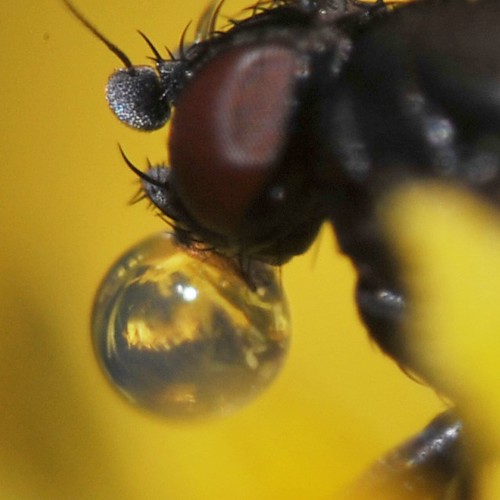 |
|
|
|
| Paul Beuk |
Posted on 19-01-2012 10:03
|
|
Super Administrator Location: Posts: 19208 Joined: 11.05.04 |
A Desmometopa of the Milichiidae.
Paul - - - - Paul Beuk on https://diptera.info |
|
|
|
| amandafujikawa |
Posted on 10-04-2012 17:26
|
|
Member Location: Posts: 2 Joined: 09.04.12 |
I think it is a form of digestion in the form of evaporation, similar to what mosquitoes do after a blood meal. They can only hold so much water before they are too heavy to fly and their osmotic balance is upset. So they bubble to reduce water and concentrate whatever meal they just had. I watched Calliphorids do it a bunch during my MS. In that case, they were feeding on blood and digesting for protein. So they would bubble until the protein/water ratio was 'right' and then they would finish digesting. Fascinating behavior, in any case!
Edited by amandafujikawa on 10-04-2012 17:28 |
|
|
|
| John Sankey |
Posted on 14-09-2012 13:27
|
|
Member Location: Posts: 160 Joined: 24.04.12 |
Nikita Vikhrev wrote: Otherwise we have the problem to explain ... the fact that Dragonflies (very warm-loving group) do not bubling, for example. Odonata chomp solid meat and use almost no liquid in digestion. Many Diptera dissolve their food externally then suck it up as a liquid; I suspect these are the species that bubble. Exception example welcome, of course! |
|
|
|
| pinny |
Posted on 09-02-2013 13:14
|
|
Member Location: Posts: 1 Joined: 16.01.13 |
pinny wrote:
almost dead fly blowing bubble indoors... Edited by pinny on 09-02-2013 13:26 |
|
|
|
| Dmitry Gavryushin |
Posted on 13-02-2014 08:04
|
|
Member Location: Posts: 3303 Joined: 17.10.05 |
This article throws some light on bubbling phenomenon: John G. Stoffolano Jr., and Aaron T. Haselton - The Adult Dipteran Crop: A Unique and Overlooked Organ. - Annu. Rev. Entomol. 2013, 58:205-25 Abstract: The diverticulated crop is a unique and overlooked foregut organ in the Diptera that affects many physiological and behavioral functions. Historically, the crop was viewed simply as a reservoir for excess nutrients. The crop lobes and crop duct form an elaborate sphincter and pump system that moves stored nutrients to the crop lobes, oral cavity, and the midgut. The storage capacity of the crop lobes is significant when filled maximally and supplies sufficient carbohydrates to sustain prolonged activity and flight, and adequate protein and lipids to facilitate reproductive events. Crop emptying is under complex neuroendocrine and neural control and may be influenced by multiple neuromessengers, such as serotonin and dromyosuppressin. The crop lobes also serve as a site for the initial mixing of enzymes from the salivary glands and antimicrobials from the labellar glands with ingested food. These food-processing functions are associated with behaviors unique to dipterans, such as regurgitation (or bubbling), nuptial gift giving, and substrate droplet deposition or trap-lining.
While others can't climb, using infinite pains, I, gravity turning to jest, Ascend, with all ease, perpendicular planes, Rough or smooth, just as pleases me best. |
|
|
|
| jonrichfield |
Posted on 14-09-2014 06:56
|
|
Member Location: Posts: 87 Joined: 04.09.14 |
Of the replies that I have had a look at so far amandafujikawa struck me as closest to the root of the matter. I have long been interested in this effect, and the first caveat is that any behaviour pattern so widespread is likely to have many component effects, so I am cautious about laying down the law. However, here are a few points to ponder: We usually see the behaviour in insects that feed on diluted fluids. (Bear in mind that there are similar cases of other insects that feed eg on plant saps or blood and have special adaptations for shedding excess water etc) I have seen the behaviour most obvious in flies feeding on dung, nectar, insect blood (such as Milichiidae sharing the meals of crab spiders) and the like. Such foods occur episodically and one must feed as much as possible as fast as possible; the meal won't last and you need a lot of it, so grab what you can and hurry! HOWEVER... with a full gut: 1: Lugging all the excess water reduces mobility, which is risky for flies. 2: While your crop is full you have no capacity for more 3: You can of course concentrate your gut content by fractionating it and excreting the diluted fluid, as many insects in fact do, but it is not always easy, though many mosquitoes do it after a blood meal. 4: However, you CAN produce a pendent droplet while you wait for your insides to deal with the rest. A droplet of such a small size has a considerable area/volume ratio and a rather tight surface curve, which promotes evaporation and concentration. Furthermore, surface tension can suspend such a small droplet quite securely. I have seen similar bubbles (very seldom, but I had not been looking carefully) in SOLITARY bees ONLY. I rather suspect that they were males, but don't trust me on that! Now, that would be consistent. Social or semi-social bees have no time to hang around evaporating drops in the open and they can do it more safely and maybe faster in a nice warm colony, with lots of their mates helping by fanning. Solitary bees have little advantage going back to the nest with diluted food, and will do better concentrating what they have at once, maybe able to top up with more nectar before leaving. Flies have nowhere special to go and are in no hurry, but they might want to top up and might not wish to carry extra mass, though I never have seen a healthy fly so burdened that it was easy to catch! So, I, the fly, sit and digest when I am full. I put my bowels to work concentrating what is inside, and as my crop is not a major organ of absorption, I dangle a nice big portion outside the crop where it can concentrate in the air. Maybe it will leave me with room for an extra portion in ten minutes or so, but even if not, a bit of concentration would do no harm. I don't think the presence of oxygen in the surrounding air would be at all beneficial; digestion is as far as I can remember, an exclusively anoxic process; I cannot think of a single case where oxygen would be desirable. In metabolism certainly, but not in digestion or assimilation; there we are more likely to want hydrolysis than oxidation. Oxidation is likely to destroy valuable nutrients or convert metallic micronutrients such as iron to undesirable oxidation states. So, for purposes of the dilute broth in my crop, I put up with the oxygen, but do not welcome it. So, in summary, for years I have had no doubt that the overwhelming proportion of the function of the droplet dangling is evaporation. |
|
|
|
| Don Micro |
Posted on 19-08-2015 12:14
|
|
Member Location: Posts: 441 Joined: 13.06.10 |
Busted!
Kim Windmolders |
|
|
|
| Jump to Forum: |


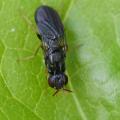



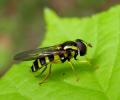
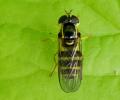

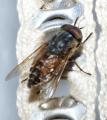
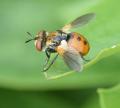



 but don't see the image in the post.
but don't see the image in the post.